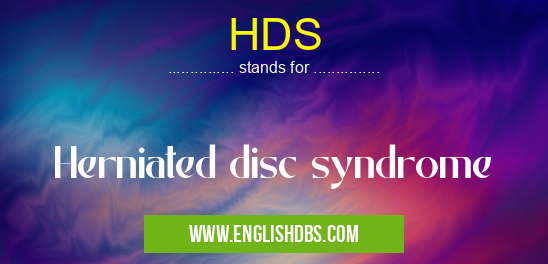What does HDS mean in PHYSIOLOGY
Herniated disc syndrome (HDS) is a condition that affects the discs located between the vertebrae of your spine. With HDS, the discs become damaged or weakened, causing them to become displaced from their normal position and press on surrounding nerves. This can cause pain, numbness, tingling, muscle weakness and/or stiffness in various parts of your body. In some cases, it can even lead to more serious medical conditions like paralysis. Understanding what causes this condition and how it's treated is important for managing its symptoms and helping you reclaim your quality of life.

HDS meaning in Physiology in Medical
HDS mostly used in an acronym Physiology in Category Medical that means Herniated disc syndrome
Shorthand: HDS,
Full Form: Herniated disc syndrome
For more information of "Herniated disc syndrome", see the section below.
» Medical » Physiology
Syndrome Symptoms
The most common symptom of herniated disc syndrome is pain in the lower back that radiates down one or both legs and sometimes even radiates into other areas of the body such as the arms or chest. Other symptoms may include numbness, tingling sensations, muscle weakness and stiffness in the affected area. These symptoms may worsen with activities such as lifting heavy objects or when sitting for long periods of time.
Treatment Options
Treatment options for herniated disc syndrome vary depending on the severity of the condition. For mild cases of HDS, rest and over-the-counter pain medications may provide relief from acute episodes of pain. Physical therapy exercises may be recommended to help strengthen muscles around affected discs as well as improve posture to reduce strain on affected areas. For more severe cases, prescription medications such as steroids or opioid analgesics may be prescribed to manage pain levels, while epidural injections into affected areas may also be used for more aggressive treatment plans. Surgery should only be considered after all other treatment options have been exhausted because it carries significant risks such as infection and nerve damage.
Essential Questions and Answers on Herniated disc syndrome in "MEDICAL»PHYSIOLOGY"
What is Herniated Disc Syndrome?
Herniated Disc Syndrome is a condition where one of the discs that lie between the vertebrae (bones of the spine) has slipped out of its usual position and is pressing on neighboring nerves. This can cause pain, tingling, or weakness in different parts of your body.
What causes Herniated Disc Syndrome?
Herniated Disc Syndrome can be caused by wear and tear over time, where the disc gradually loses its ability to keep itself in place, or it could be due to an injury or accident. Age-related changes can also contribute as discs tend to lose their shock-absorbing properties as we age.
Which symptoms should I look out for with Herniated Disc Syndrome?
The most common symptoms are localized back pain, muscle spasms, radiating pain in various parts of the body such as down the leg, numbness or tingling sensations in areas like hands and feet, disturbances in bowel and bladder habits, and weakened muscles.
How is Herniated Disc Syndrome diagnosed?
Diagnosis usually begins with a physical exam to assess range of motion and any tenderness around the area of concern. Your doctor may also order scans such as CT scans or MRIs to get a better understanding of the damage sustained.
Is there a cure for Herniated Disc Syndrome?
Although there is no cure for Herniated Disc Syndrome itself, there are treatments available that can help alleviate your symptoms depending on what's causing them. These could include physical therapy sessions, lifestyle changes such as diet and exercise adjustments, medications to reduce inflammation, injection therapy such as steroids or nerve blocks; or even surgery if conservative treatments prove unsuccessful.
Can bed rest help with my Herniated Disc Syndrome?
Rest can definitely help reduce swelling and lower pain levels during an acute episode but it isn't necessarily a long-term solution since re-activating the muscles around the problem area helps improve circulation which aides healing. Balance between rest and light activity is key!
Does working out worsen my condition?
Working out won't worsen your condition but activities that twist your spine should be avoided at first until your symptoms subside so you don't aggravate it further. It's best to start slow with low intensity exercises such as walking/swimming/biking/yoga until you feel stronger again!
Will I need medication for relief from my herniated disc issues?
That depends on your individual case - if mild symptom relief doesn't come from physical therapies then short-term use of anti-inflammatory drugs or muscle relaxants may be recommended under careful medical supervision); however if these don't seem to do enough longer term medications might prescribed for more effective control.
Final Words:
If you're experiencing symptoms associated with herniated disc syndrome then it's important to seek medical attention right away. A doctor can accurately diagnose HDS by performing an MRI scan and they will then be able to recommend a treatment plan tailored specifically to your needs that will help manage symptoms so you can get back to living a normal life again!
HDS also stands for: |
|
| All stands for HDS |
